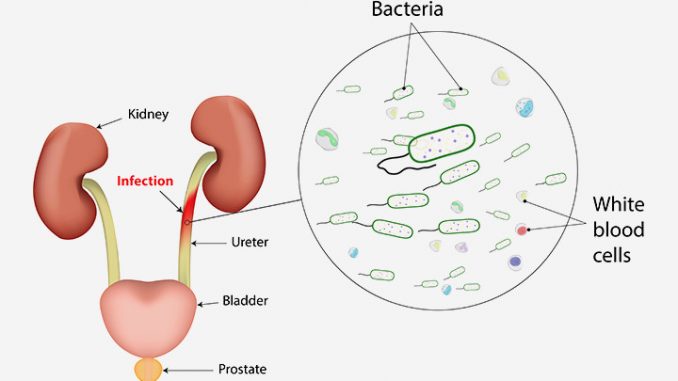
When Claudine Jalajas felt pain and burning during urination plus the increased frequency of urges to go, she knew right away it was time to visit her doctor. Even though the symptoms of a bladder infection often mirror the normal body reaction to pregnancy, Jalajas recognized the difference.
One out of five women will develop cystitis, more commonly known as a bladder infection, during her lifetime
Know the Risks of UTI During Pregnancy
One out of five women will develop cystitis, more commonly known as a bladder infection, during her lifetime. Women who are prone to the infections have them at any time, under almost any circumstance. But most women are like Weiss and will only suffer from an infection during pregnancy.
“Cystitis is an infection that occurs anywhere the body stores or releases urine,” says Dr. Jack Cassell, author of the book Better Living Through Urology: 21st Century Solutions to Age-Old Problems (Acorn Publishing, 2004). “Caused by bacteria in or around the urethra, cystitis often results in a burning feeling during urination, frequent or intense urges to urinate, pain in the back and the lower abdomen and cloudy, dark, bloody or unusual smelling urine.”
When a woman is pregnant, especially well into her pregnancy, many of those symptoms are part of her everyday routine. After all, what pregnant woman doesn’t need to run to the ladies’ room every hour? If the woman has never had an infection, she might not be aware that she could be experiencing a UTI (urinary tract infection), and it is important that she knows, says Dr. Daniel Rukstalis.
Dr. Rukstalis, the director of the department of urology at the Geisinger Health System in Danville, Pa., says the commonly used “UTI” is a catch-all title for two specific infections: a bladder infection and a kidney infection.
“Bladder infections are usually safe infections that easily go away with antibiotics,” says Dr. Rukstalis. Bladder infections are not usually a cause for concern. However, bladder infections can turn into kidney infections, and that’s where the real problem lies, especially for pregnant women.
The symptoms of a kidney infection are similar to the ones for cystitis, but the woman can also develop a fever, pain in the kidney area (usually isolated to the kidney with the infection), nausea and vomiting. Unusual exhaustion can also be a sign the body is trying to fight the infection.
A kidney infection is always a serious illness. Untreated, it can lead to septic poisoning. Pregnant women need to act promptly if a kidney infection is suspected. “The danger of a kidney infection for a pregnant woman is the increased risk of miscarriage or premature delivery,” says Dr. Rukstalis. “A woman who is early in her pregnancy and has a kidney infection can miscarry. Later in the term, a kidney infection can force early labor.”
Because of all the changes happening in a woman’s body during pregnancy, a bladder infection turning into a kidney infection is easier than it would be in a non-pregnant woman. Even women who suffer from chronic bladder infections that never turn into kidney infections find themselves at greater risk of the infection moving into the kidneys. If a pregnant woman is unsure that her symptoms are a result of the pregnancy or a sign of a bladder infection, she should ask her doctor to do a urine culture and, if necessary, follow up with a urinalysis.
Treatment and Prevention Of UTI during pregnancy
Treating a bladder infection or a kidney infection is usually done with antibiotics. However, some regular treatments for urinary tract infections can be dangerous for a fetus. Drugs in the penicillin family are usually the safest. Sulfa drugs, which are commonly used for treating kidney infections, are a mixed bag. Some are safe, but others, such as methoxazal, are not. If it is at all possible, a pregnant woman should confer with a urologist to treat urinary tract infections.
Although no prevention plan is 100 percent foolproof, there are steps women can take to decrease the chances of contracting a bladder infection.
- First, drink plenty of water. Water is good for pregnant women in any case, as it helps to keep down swelling and bloating. Drinking plenty of water also keeps the urinary tract area well flushed and easier to keep bacteria free. An old wives’ tale is to drink cranberry juice, but there is some belief among the medical community that this works. The acids in cranberry juice work to kill the bacteria that cause infections.
- Avoid constipation. Eating plenty of fiber and having regular bowel movements reduces the risk of infection and bacteria growth. And, Dr. Rukstatis says, if nothing else, avoiding constipation lowers the chances of hemorrhoids.
- Bubble baths and underwear made from synthetic materials may also irritate the vaginal area, and while that may not cause bladder infections, it can create added discomfort.
Some women find they are prone to getting a bladder infection after sex. A woman who battles with bladder infections after sexual activity will want to decrease sexual activities during pregnancy. However, there is an antibiotic, Nitrofurantoin, which is safe to use during pregnancy. A dose is taken after sexual activity. The antibiotic should kill any bacteria entering the urinary tract area.
There is some disagreement on the correlation between urinating immediately after sex and bladder infections. Some doctors, including Dr. Cassall, believe this decreases the buildup of bacteria, but other doctors, including Dr. Rukstatis, are not sure the practice makes a difference.
Knowing when to alert the doctor to a possible bladder infection can be difficult, especially for women who have never experienced a bladder infection before. But it is always better to err on the side of caution than to let an easily treated infection turn into a serious problem.
Content provided on this site is for educational purposes only and should not be considered as medical advice, diagnosis or treatment.
Leave a Reply